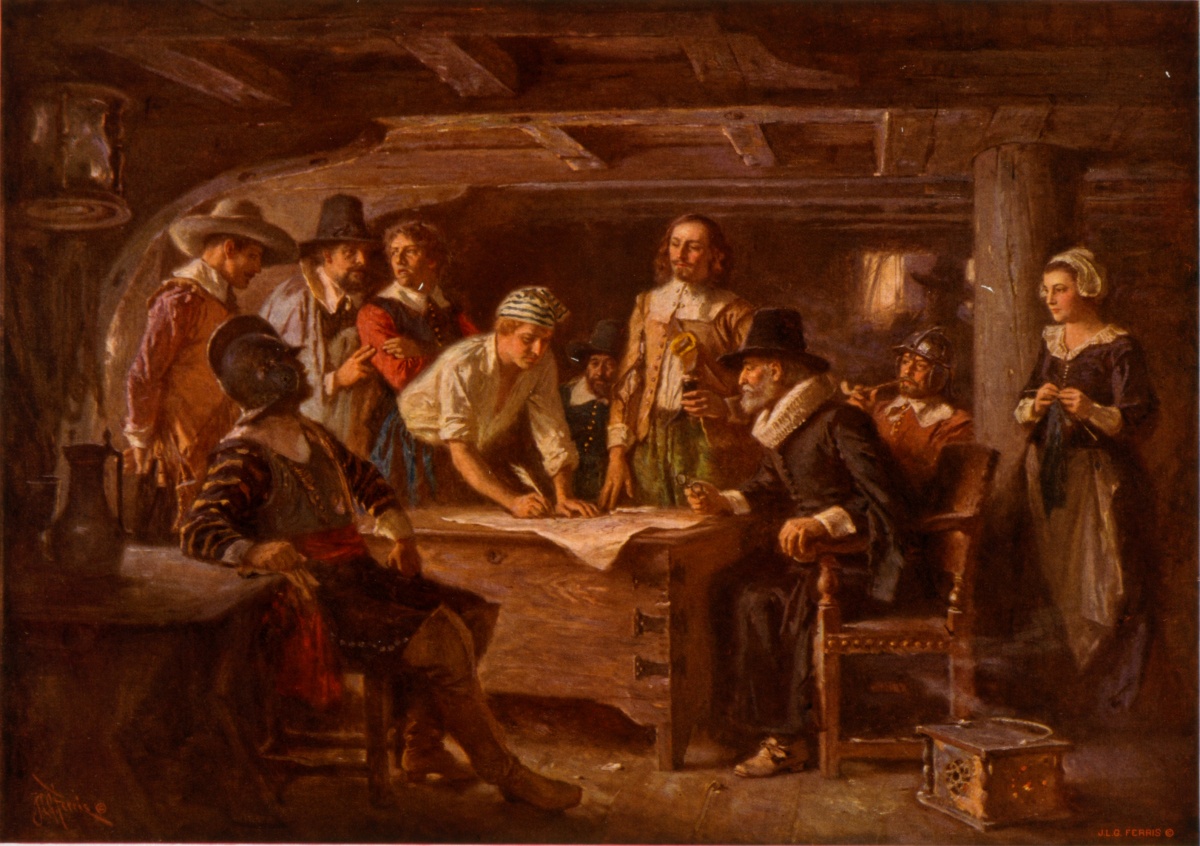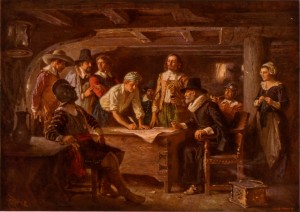If you have been following these pages for any length of time, you know that my family is heavily involved in family research. We can trace our ancestors back to a common ancestor that arrived in the new world in 1640 in Scituate Massachusetts. Knowing where one comes from is exciting, I think everyone secretly hopes that we come from royalty, but sometimes the story is just as good for the plain folks.
My family, like most that bear the name Preble in America, descend from a common ancestor, Abraham Preble. He came from Kent England in 1640 and settled in Scituate Massachusetts. He part of what is now known as the First Trinitarian Congregational Church of Scituate. His soon to be a father in law, was the ruling elder of the Church. This Church was founded by a group of English Separatists (or dissenters as they are sometimes called) who came to America shortly after the Pilgrims landed at Plymouth.
17th century England was not a pleasant place to live if you did not agree with the Established Church that is the Church of England. There were two types’ nonconformists and separatists. The nonconformists stayed in the Church of England and attempted reform from within. They did not believe that the reformation went far enough and that there were too many popish elements left in the Church. There was the sense that one could worship separate from all of the trappings of worship, vestments, incense, etc.
The separatists were those who separated themselves from the Church of England, at great risk. They disagreed with the fact that the sovereign was the head of the Church and abide by a strict separation of Church and State. They held the belief that each local Church community was sovereign from others and could worship as they saw fit. They did not need bishops or canons to direct their lives they had Scripture that was sufficient for them and their lives. The minister, although an important part of the life of the community was just that, part of the community, called from and into the community to be their spiritual head and provide for the sacramental life of the Church. However, decisions were made by the congregation itself meeting together.
The first group was established in Scrooby a town in South Yorkshire England under the leadership Richard Clifton and met in the home of William Brewster, who would later sail on the Mayflower for the new world. They found it difficult to worship there, so the decision was made to immigrate to Leiden in the Netherlands, but they did not last long there. They found that as foreigners they were only allowed to take unskilled labor jobs, and their children were growing up more Dutch than British.
When the opportunity presented itself to go to America they took it and in July of 1620, after negotiations with the London Company that would finance their trip, they set sail from Leiden on the ship Speedwell. A Royal Charter was given with the understanding that the religion would receive official sanction. Due to difficulties with the ship, William Bradford believed that the crew of the ship was deliberately sabotaging the ship so the voyage would not happen. Eventually, the passengers transferred to the Mayflower for the cross-Atlantic journey.
History will tell the tale of the Pilgrims arriving at Plymouth Rock and their settlement, but the story did not end there.
In and around the town of Kent in the early 1600’s house churches had been established. This unsettled the king as any challenge to his rule was a challenge to his sovereignty and so the leaders, and some of the congregation, were arrested and sent to prison. One of them was the Rev. John Lothrop, who was released but ordered to leave England in 1634.
Rev. John Lothrop and 30 of his followers left England and settled in Scituate, a town that had been first settled by others from Kent before 1628. There they established the Scituate Congregational Church and Rev. Lothrop was installed as minister in December of 1634 becoming the fourth church in the Plymouth Colony.
I am unsure as to why Abraham Preble left Kent, but it was to this community that he would come. As this was s community founded by separatists, I am led to believe that he was a follower of this religion, and that is one of the reasons he came. There is no evidence that Abraham Preble was ever arrested although he was 31 at the time the Rev. Lothrop left for America. There is no clear evidence as to why he left although like man, I am sure it was for a new life promised in a new world.
I think we sometimes have a romantic notion that the Pilgrims were fleeing persecution by the king. However, they were freely worshipping in the Netherlands, so there were other reasons driving them to the new world. Also, their religion would not be recognized, nor supported by the King. If we want to think of this in romantic terms, they came to the new world for the same reason most come, for a better life.
He was not a man of means, and more than likely came to the new world as some servant to have his passage paid. In his book, The First Three Generations of Prebles in America, Rear Admiral George Henry Preble talks of Abraham as some sort of noble man but I can find no evidence of that in any reliable source to this date. He married Judith Tilden, daughter of the Ruling Elder of the Church Nathaniel Tilden on January 3, 1641. Judith was the 8th child and 3rd girl to be born to Nathaniel and Lydia Tilden and although an Elder and a man of great lands and means marrying off your daughter to anyone in those days, especially one that would inherit very little due to her place in the birth order, was no small feat.
Soon after their marriage, again for reasons that are unclear, Abraham moved to what was to become York Maine, and there made a very successful life for himself and his family.
Perhaps it was religious freedom that brought Abraham. Perhaps it was economics that brought him; he was the 7th child and his chances at any substantial inheritance were almost nonexistent. But the truth be told, for him to have married the daughter of the ruling elder he would have had to have been part of the Church of Scituate and thus would have had separatist’s beliefs.
We New Englanders owe much to these brave souls who left the old world for the new. Some had to leave and left for religious reasons, and some left for other reasons but it was their spirit of a separation of the Church from the state that gave us this philosophy in America today. There is much we can learn from these men and women, and I look forward to the journey.


